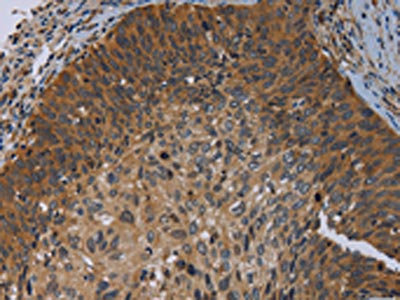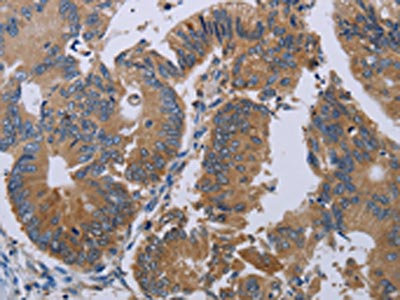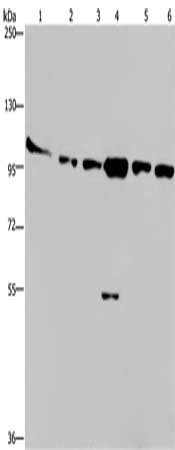PRKD3 Antibody
-
货号:CSB-PA145264
-
规格:¥1100
-
图片:
-
The image on the left is immunohistochemistry of paraffin-embedded Human cervical cancer tissue using CSB-PA145264(PRKD3 Antibody) at dilution 1/50, on the right is treated with synthetic peptide. (Original magnification: ×200)
-
The image on the left is immunohistochemistry of paraffin-embedded Human colon cancer tissue using CSB-PA145264(PRKD3 Antibody) at dilution 1/50, on the right is treated with synthetic peptide. (Original magnification: ×200)
-
Gel: 6%SDS-PAGE, Lysate: 40 μg, Lane 1-6: Human testis tissue, K562 cells, A549 cells, Raji cells, NIH/3T3 cells, Hela cells, Primary antibody: CSB-PA145264(PRKD3 Antibody) at dilution 1/200, Secondary antibody: Goat anti rabbit IgG at 1/8000 dilution, Exposure time: 10 minutes
-
-
其他:
产品详情
-
Uniprot No.:O94806
-
基因名:
-
别名:EPK 2 antibody; EPK2 antibody; KPCD3_HUMAN antibody; nPKC nu antibody; nPKC-nu antibody; nPKCnu antibody; nu antibody; PKCnu antibody; PKD 3 antibody; PKD3 antibody; PRK D3 antibody; PRKCN antibody; PRKD 3 antibody; Prkd3 antibody; Protein kinase C antibody; Protein kinase C nu antibody; Protein kinase C nu type antibody; Protein kinase D3 antibody; Protein kinase EPK 2 antibody; Protein kinase EPK2 antibody; Serine threonine protein kinase antibody; Serine/threonine protein kinase D3 antibody; Serine/threonine-protein kinase D3 antibody
-
宿主:Rabbit
-
反应种属:Human,Mouse
-
免疫原:Synthetic peptide of Human PRKD3
-
免疫原种属:Homo sapiens (Human)
-
标记方式:Non-conjugated
-
抗体亚型:IgG
-
纯化方式:Antigen affinity purification
-
浓度:It differs from different batches. Please contact us to confirm it.
-
保存缓冲液:-20°C, pH7.4 PBS, 0.05% NaN3, 40% Glycerol
-
产品提供形式:Liquid
-
应用范围:ELISA,WB,IHC
-
推荐稀释比:
Application Recommended Dilution ELISA 1:1000-1:2000 WB 1:200-1:1000 IHC 1:50-1:200 -
Protocols:
-
储存条件:Upon receipt, store at -20°C or -80°C. Avoid repeated freeze.
-
货期:Basically, we can dispatch the products out in 1-3 working days after receiving your orders. Delivery time maybe differs from different purchasing way or location, please kindly consult your local distributors for specific delivery time.
相关产品
靶点详情
-
功能:Converts transient diacylglycerol (DAG) signals into prolonged physiological effects, downstream of PKC. Involved in resistance to oxidative stress.
-
基因功能参考文献:
- Our findings suggest that abnormal PKD3 expression might contribute to hepatocellular carcinoma progression. Furthermore, high PKD3 expression predicts a poor prognosis in hepatocellular carcinoma patients after hepatectomy PMID: 28363424
- The enriched pathway analysis reveals that PRKD3 regulates pathways contributing to multiple cancer related events, including cell cycle, migration and others. PMID: 28656000
- None of the Polymorphous low-grade adenocarcinoma (PLGA) lacking PRKD1 somatic mutations or PRKD gene family rearrangements harboured somatic mutations in the kinase domains of the PRKD2 or PRKD3 genes. PMID: 26426580
- This study discovered and characterized a novel, highly conserved N-terminal domain, comprising 92 amino acids, which mediates dimerization of Protein Kinase D (PKD) isoforms, PKD1, PKD2, and PKD3 monomers. PMID: 27662904
- Studies indicate that the loss of protein kinase D PKD1 is thought to promote invasion and metastasis, while PKD2 and upregulated PKD3 to be positive regulators of proliferation. PMID: 26253275
- Loss of PKD2 enhanced KC proliferative potential while loss of PKD3 resulted in a progressive proliferation defect, loss of clonogenicity and diminished tissue regenerative ability. PMID: 25802335
- for the first time, PKD3 is implicated in the transcription activation of latent HIV-1 provirus, and our results revealed a molecular mechanism of prostratin-induced HIV-1 transcription via PKCepsilon/PKD3/NF-kappaB signaling pathway. PMID: 25136641
- Activation of PKD2 and further increase of PKD3 activity leads to additional phosphorylation and inhibition of endogenous phosphatase slingshot 1L. PMID: 24840177
- PKD3 in TNBC cells provides a molecular connection between the Golgi and endolysosomal compartments to enhance proliferative mTORC1-S6K1 signaling. PMID: 24337579
- PKD3 negatively regulates human airway epithelial barrier formation and integrity through down-regulation of claudin-1, which is a key component of tight junctions. PMID: 24265314
- PKD3 may contribute to the malignant progression of prostate cancer cells through negative regulation of MMP-7 expression. PMID: 20813660
- PKD3 contributes to the proliferation and malignant growth of androgen-dependent prostate cancer cells in part by upregulating PSA expression. PMID: 20813663
- We have identified PKD2 and PKD3, especially PKD3, as novel cell growth regulators in HCC1806 triple-negative breast cancer cells PMID: 23393329
- PKD antagonists inhibited differentiation and viability of human hematopoietic stem cells, and had less HDAC phosphorylation, confirming the need for PKD-HDAC signaling in erythropoiesis. PMID: 22983445
- phosphorylation of GIT1 on serine 46 by PKD3 represents a molecular switch by which GIT1 localization, paxillin trafficking, and cellular protrusive activity are regulated. PMID: 22893698
- Data demonstrate the functional role of protein kinase D1 and protein kinase D3 in modulating physiological responses to Ox1R activation. PMID: 20621130
- Novel isoforms regulate human keratinocyte differentiation by activating a p38 delta mitogen-activated protein kinase cascade that targets CCAAT/enhancer-binding protein alpha. PMID: 12080077
- PKCnu is an important component of signaling pathways downstream from novel PKC enzymes after B-cell receptor engagement PMID: 12506120
- the effect of G protein-coupled receptor agonists on the regulatory properties, continuous shuttling, and intracellular distribution of Protein kinase C nu/protein kinase D3 PMID: 12676944
- specificity of different PKD isoforms in regulating protein trafficking from the trans-Golgi network PMID: 14743217
- PKD3 directly contributes to insulin-independent basal glucose uptake in L6 skeletal muscle cells. PMID: 15496505
- Expression of constitutively activated PKCeta caused Golgi fragmentation. PMID: 15824133
- the catalytic activity of PKD3 may regulate its nuclear import through autophosphorylation and/or interaction with another protein PMID: 16380377
- The vesicular distribution may be attributed in part to the direct interaction between PKD3 and vesicle-associated membrane protein VAMP2, through which PKD3 may regulate VAMP2 vesicle trafficking by facilitating its recruitment to the target membrane. PMID: 17196367
- A pathway comprising PKCs>Raf-1>MEK-1>ERK-1/-2 mediates the effect of gastrin on the CgA promoter, and strongly suggests that enhanced phosphorylation of Sp1 and CREB is crucial for CgA transactivation through the G protein-coupled CCK-B/gastrin receptor. PMID: 17889508
- The data suggest that protein kinase C contributes to the phosphorylation of influenza PB1 and NS1 proteins which appears to be functionally relevant for both viral RNA polymerase activity and efficient viral replication. PMID: 19264651
显示更多
收起更多
-
亚细胞定位:Cytoplasm. Membrane. Note=Translocation to the cell membrane is required for kinase activation.
-
蛋白家族:Protein kinase superfamily, CAMK Ser/Thr protein kinase family, PKD subfamily
-
组织特异性:Ubiquitous.
-
数据库链接:
HGNC: 9408
OMIM: 607077
KEGG: hsa:23683
STRING: 9606.ENSP00000234179
UniGene: Hs.660757
Most popular with customers
-
-
YWHAB Recombinant Monoclonal Antibody
Applications: ELISA, WB, IF, FC
Species Reactivity: Human, Mouse, Rat
-
Phospho-YAP1 (S127) Recombinant Monoclonal Antibody
Applications: ELISA, WB, IHC
Species Reactivity: Human
-
-
-
-
-























